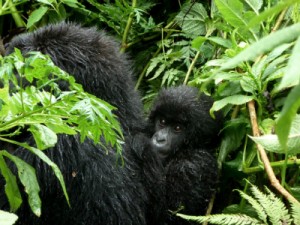The numbers of tourists to Uganda for mountain gorilla trekking is expected to shoot up since the cost of gorilla permits was slashed. A gorilla trekking permit for Bwindi national park in Uganda for Ugandans and East Africans has been reduced from sh250,000 to sh150,000
Non-resident foreigners pay $350, down from $500. The price of gorilla tracking permits for foreigners resident in Uganda was dropped from $475 to $300.
According to officials from Uganda Wildlife Authority, Ugandans and East Africans are fast picking interest in the primates tracking. Muhangi said that it is easier and more adventurous to track the critically endangered mountain gorillas in Uganda than it is elsewhere in the Great Lakes region.
Uganda Wildlife Authority launched the gorilla tours promotion to enable visitors enjoy the amazing gorilla experience at subsidized rates. The promotion has been on since April 1 and ends on May 31, and then from 1st – 30th November. It is open to all visitors, tour operators and partners of Uganda Wildlife Authority.
Gorilla trekking dates back to 1993 when 2 gorilla families were habituated. Habituation is the process of making wild gorilla families accustomed to human beings, thereby facilitating close interaction without the danger of gorillas displaying aggressive behaviour. According to the 2011 gorilla census, there are 440 gorillas in Bwindi Impenetrable National Park compared to 100 five years before. This is almost half of the world’s remaining total population! Today, Uganda has over 10 gorilla families among which include Kahungye, Mubare, Rushegura, Habinyanja, Oruzogo, Bitukura, Nshongi, Mubare, Mishaya, Nkuringo, amd more are developing.
Uganda gorilla trekking / Gorilla tourism is the leading revenue earner among all Uganda’s tourism attractions. Each day, only eight visitors are allowed to visit a gorilla group for a maximum of one hour.The minister of tourism, Maria Mutagamba contends that, other than gorilla tracking, Uganda has many more attractions for the tourist. Uganda Tourism earned $820m from 1050 guests last year.
There are 50 million tourists coming to Africa every year. The challenge is to have them stay longer and spend on a variety of services in the tourism chain,” Mutagambwa said

